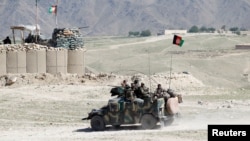Afghan forces are planning to hand over the security responsibilities to the local forces of the rural communities, they have recently captured from Taliban and IS militants, in eastern Nangarhar a province that borders Pakistan.
Nangarhar provincial officials said hundreds of local men, armed by Afghan National Directorate of Security, are ready to fight against IS in Khogyani district where joint Afghan security forces recently ended a 15-day long anti-IS operation.
"For the time we have 300 men ready to protect their villages [against IS militants] and if the situation requires, we will arm more people to fight," said Attaullah Khogyani, a spokesperson for the governor of Nangarhar.
According to the Afghan officials, the total number of such forces in Nangarhar province is close to 1000.
"We have 500 local forces in Pachir Agam district, 300 in Khogyani district and another 100 in Kot district," said Hayat Khan, Chief of Nangarhar Coordination Center of Uprising Local Forces.
Afghan officials claim the force in Pachir Agam district is effectively providing security to the district and to the Tora Bora area, once the stronghold of slain Al-Qaida leader Osama bin Laden.
Some local residents have expressed support for a joint Afghan security forces operation in Khogyani district where fighting between the Taliban and IS militants caused hundreds of families to flee.
"We ask the government to build more security posts. We do not want IS and the Taliban to come back here and fight. Fighting made us leave our houses in this cold season of the year. Locals have the ability to protect their communities," a local resident identified only as Azizullah, told VOA.
Afghan officials also said that hundreds of these local men had military training and are currently providing security under the local police force. The Afghan government is arming them with weapons and have them on payroll.
Concerns Over Instability
Experts have been expressing fear that these forces may cause more insecurity.
Wadeer Safi, a professor at Kabul University, claimed that there are reports about the these forces joining local police in armed robbery.
"In some districts the so-called local police and upraising force, especially when they are stationed far from districts centers, have turned into 'robbers', using their weapons to plunder and kidnap girls," Safi said. "I have not seen any positive effect of these forces in terms of providing security in the country.
Ahmad Shah Wardak, a military expert, agrees with the ineffectiveness of the local forces. He believes they need to be centralized and controlled by the Afghan government. "The Afghan government needs to develop a proper strategy in terms of how to support, train and arm those locals who are frustrated from [Taliban and IS] brutalities, and recognize those warlords, especially in northern Afghanistan, who under the name of local uprisings commit crimes, including rape and plunder."
In a report published in July 2017, the Afghan Independent Human Rights Commission documented a number of abusive and criminal actions committed by local uprising forces in northern Afghanistan. They asked the Afghan government to take legal measures to prevent the arbitrary actions of irresponsible armed forces who violate international human rights.
In a recent incident in the Achin district of eastern Nangarhar province, a man belonging to local uprising forces opened fire on U.S. military forces. A NATO statement confirmed that during the shootout one U.S. Army service member was wounded. However, Afghan local authorities said that two U.S. soldiers were killed and another wounded. Afghan officials also confirmed the death of two local uprising force commanders and one local Afghan interpreter in the shootout.
Afghan defense officials have said that Afghan local forces would be transitioned or dissolved within the ranks of Afghan National Army and police. However, experts say that while the government has made some strides, overall it failed to train and merge them in Afghan National Army or Police ranks.
Zia UrRahman Hasrat in Nangarhar contributed to this report




